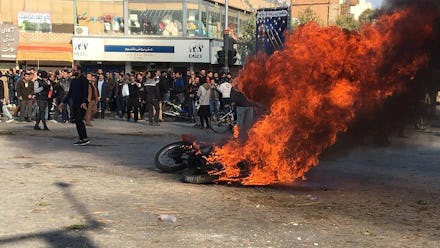Iranian government shuts down the internet in retaliation for fuel price protests

Amid ongoing protests against rising fuel prices, the Iranian government shut down the internet on Saturday, according to reports from CNN and Vice this week. As of press time, Iran is still offline.
Iran’s economy has struggled since 2017, when President Trump imposed sanctions and ended an Obama-era nuclear deal. Since then, civilians have experienced food and medical equipment shortages, plunging currency, and steep prices. On Friday, officials announced fuel would cost 15,000 rials ($0.12) per liter, a 50% increase. Drivers will only be allowed to purchase 60 liters a month before another price increase to 30,000 rials, per BBC.
The announcement angered citizens, who gathered in about 100 cities to express their content. The Tehran-based Fars News Agency reported that dozens of buildings were set on fire and approximately 1,000 people were arrested. Law enforcement responded with violent force and shot live rounds at protesters. The death toll is uncertain, but unverified sources estimated that about 200 people have been killed and another 3000 sustained injuries, per the BBC.
Some of the violence against the protesters was caught on tape. Citizens have been warned that sending videos outside of the country is illegal. Meanwhile, families of the dead claim the government will not hand over their loved ones’ corpses.
Iranian officials downplayed the gravity of the situation and blamed the protests on foreigners. "The counter-revolution and Iran's enemies have always supported sabotage and breaches of security and continue to do so," Supreme Leader Ayatollah Ali Khamenei said during a broadcasted speech Sunday. "Unfortunately, some problems were caused, a number of people lost their lives and some centers were destroyed."
The government claimed money made from the price hike will generate $2.55 billion a year for 60 million low-income citizens. On Monday, an Iranian government spokesperson bragged about how the government dealt with the unrest, according to The Associated Press.
“Today the situation was calmer — more than 80% compared to yesterday,” the representative said. “Only some minor problems remain, and by tomorrow and the day after, there will remain no special riots.”
Gen. Gholamreza Soleimani, head of the Basij paramilitary guard force, said the squad used “restraint and patience.” “Destruction and disturbances have been done by rioters that we refer to as thugs and hoodlums,” he continued.
The U.S. government condemned Iran’s response to the demonstrations and expressed solidarity with the civilians. “We condemn the lethal force and severe communications restrictions used against demonstrators,” the White House said in a statement. “Tehran has fanatically pursued nuclear weapons and missile programs, and supported terrorism, turning a proud nation into another cautionary tale of what happens when a ruling class abandons its people.”
Secretary of State Mike Pompeo also spoke out in a separate statement. “The Islamic Republic must cease violence against its own people and should immediately restore the ability of all Iranians to access a free and open Internet,” Pompeo said. “The world is watching.”